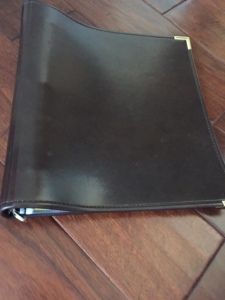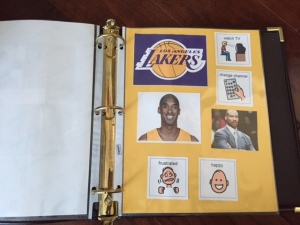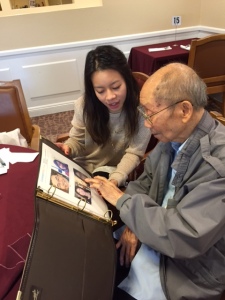Today I visited my grandpa at his assisted-living facility and brought different options for him to choose from including different book sizes, multiple page layouts, and different pictures associated with the same word. First, I had him choose which size book he wanted from 2 different options: a larger binder with a soft cover (so it’s lighter to carry) or a smaller scrapbook. I explained to him that since I wanted him to carry this book with him wherever he went, it was important that it was big enough for him to see the pictures but also light enough for him to carry. He chose the scrapbook.
Next, I had him choose how many pictures he wanted to a page. I created different sample pages and asked which page could he see the pictures best – he went with 4 pictures to a page. We also did some practicing/testing (e.g. “If you wanted to tell someone you were cold, which picture would you point to?”) so that I was sure he really could see the pictures. At times, I adapted “errorless learning” so that he wouldn’t associate the wrong picture to the word. I’m sure we will do more of this once I start training him how to use the book.
Then, I introduced a rating scale I had found on the PrAACtical AAC blog (http://praacticalaac.org/praactical/5-ways-to-use-rating-scales-to-enhance-communication-with-aac/). My original intention was that he would use the scale to tell me how likely he is to use the picture presented but I could see it was confusing him so I scraped it. I explained to my grandpa that I only wanted to include words in his book that he would actually use. For example, when showing him the picture for “worried” I explained that though he may feel worried at times, is this something he would tell someone? At first, I was afraid he wasn’t understanding the exercise but eventually he was able to look at the picture and either move it to the “yes, I want this included in my book” pile or the “no, I will not use this word” pile.
Lastly, with the help of my mom who is one of the people most familiar with him, I asked him what other words/ideas/phrases he would want included in his book that I hadn’t thought of. We decided he needed to have different sports pages for all the sports he watches on TV – tennis, basketball, football, golf. He motioned boxing with his hands to indicate he also watched boxing which I was surprised to find out! Also, pictures of his grandchildren and friends at his facility so he could talk or ask about them.

4 pictures to a page. He also said that a black background was easier to see the pictures vs. a white background.

Rating scale which can be found at: http://praacticalaac.org/praactical/5-ways-to-use-rating-scales-to-enhance-communication-with-aac/
Today took more time than I had originally anticipated but it was a good reminder to me of how difficult a task language is for persons with aphasia, something we take so easily for granted every day. But I feel good about the progress made so far and that through this step, my grandpa was able to take greater ownership in the project.




Awesome work, Elizabeth! I love hearing how you provided authentic choices so that this new tool is both for him and by him.
LikeLike
I found you off a link on Facebook. Keep on writing. I am counting on you to inspire me. I am a former nurse and presently I am in an undergrad psycholgy program. I hope to switch majors to become a SLP.
LikeLike
Thank you for visiting my blog! It is tremendously encouraging to hear that my words are reaching someone like you and will hopefully provide information as you pursue this field, good luck! 🙂
LikeLiked by 1 person